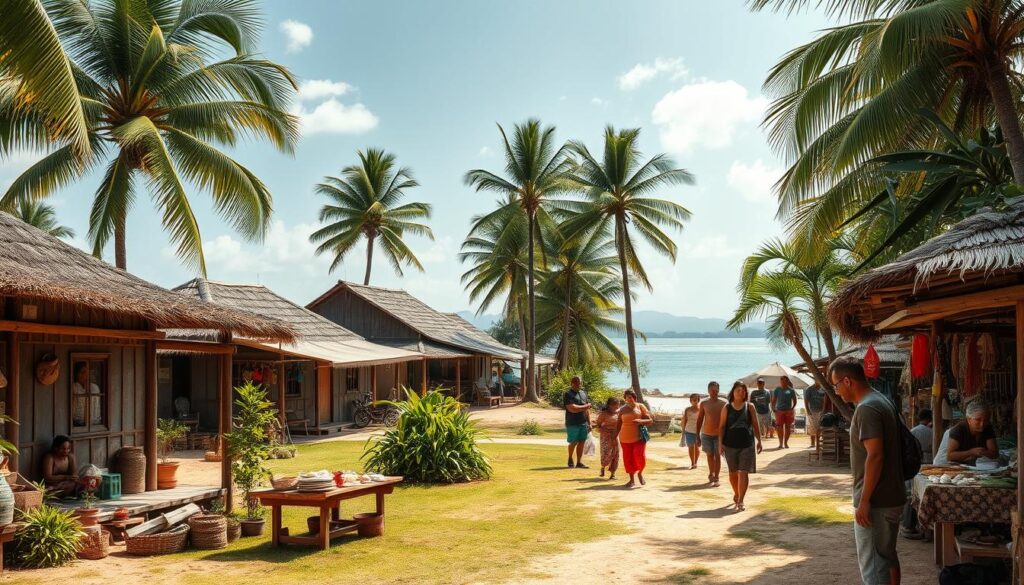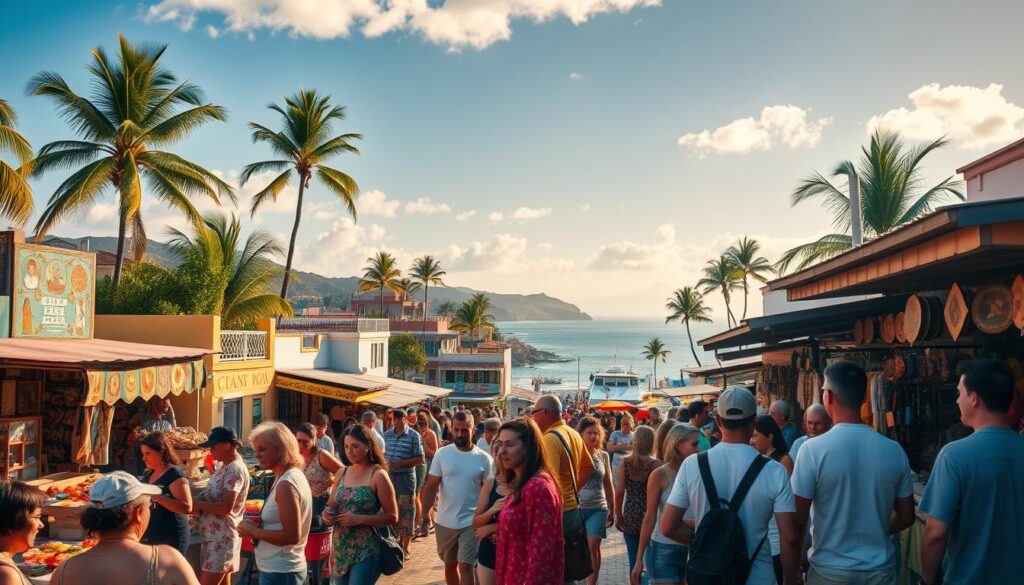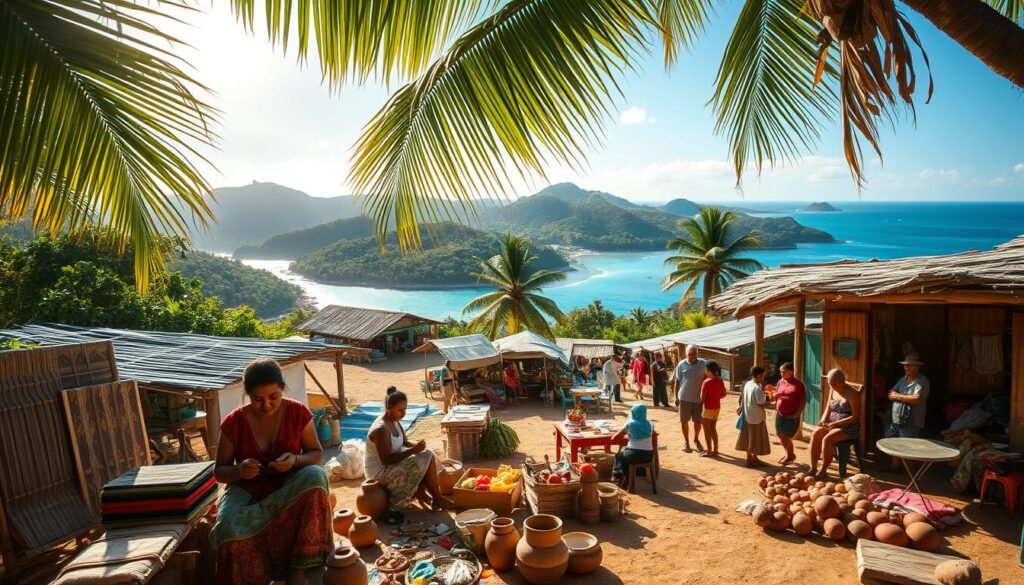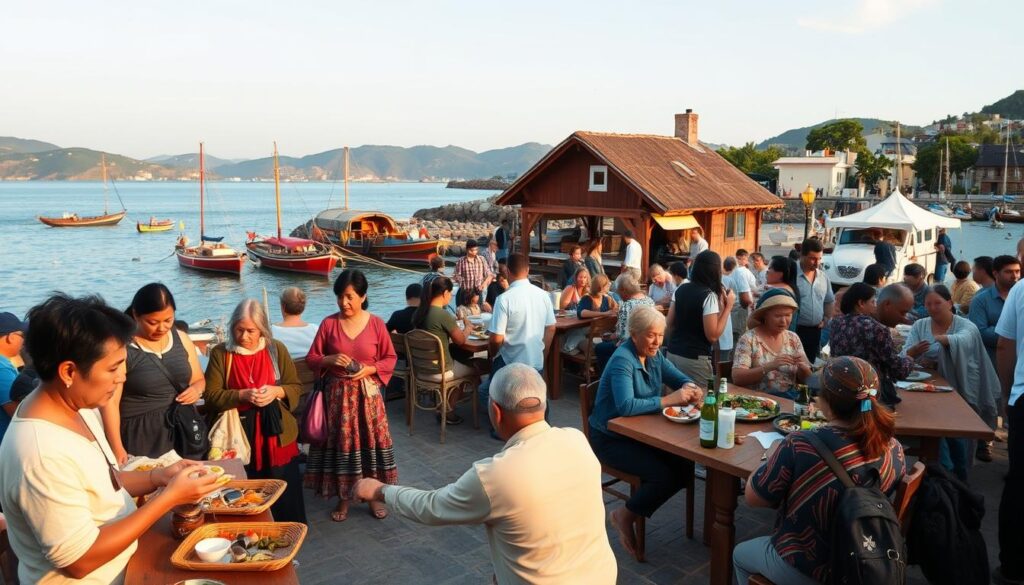Imagine standing on a pristine beach, watching the sun set over the horizon. The sound of waves and local artisans nearby make it special. Each visit to an island fuels your wanderlust and connects you to the community.
When you engage with island tourism, you support local communities. This ensures economic benefits reach those who need them most. Responsible tourism in the islands goes beyond just observing. It’s about contributing to sustainable community development that honors local culture and environment.
By embracing sustainable tourism practices, you uplift island communities. This creates a symbiotic relationship that improves both visitor experiences and the livelihoods of residents.
Key Takeaways
- Island tourism significantly contributes to local community development.
- Engaging in responsible tourism practices helps preserve cultural heritage.
- You can make a positive impact by choosing sustainable tourism options.
- Local economies thrive when tourists support local businesses.
- Tourism can foster a stronger sense of community among residents.
- Participating in island tourism promotes environmental sustainability.
The Importance of Island Tourism for Local Communities
Island tourism is key to boosting local economies. It creates jobs and supports sustainable growth. This sector brings in money and helps communities grow stronger.
By supporting local businesses, tourists help keep money in the community. This helps the local economy thrive.
Understanding Tourism’s Economic Impact
Tourism does more than just add numbers. It helps fund important things like schools and hospitals. It also boosts local businesses, helping them grow.
Island economies rely heavily on tourism. It drives development and helps the islands prosper.
Creating Job Opportunities for Residents
Jobs in tourism are plentiful, from hospitality to guiding. These jobs help keep the economy stable. They ensure locals can enjoy the benefits of tourism.
This growth improves life in the islands. It addresses job needs and raises the standard of living.
| Sector | Type of Job | Example Roles |
|---|---|---|
| Hospitality | Service Jobs | Hotel Staff, Restaurant Workers |
| Local Arts & Crafts | Production Jobs | Artisans, Craftsmen |
| Guiding Services | Tourism Jobs | Tour Guides, Wildlife Experts |
Supporting Local Communities: Responsible Tourism in the Islands
Responsible tourism means traveling in a way that helps both visitors and locals. It’s about being ethical, respecting cultures, and caring for people’s well-being. By understanding what communities need, you can help make tourism better for everyone.
Defining Responsible Tourism
Responsible tourism is about making smart choices that help the environment and people. It’s about choosing travel that respects local ways and helps communities grow. It means knowing and caring for the places and cultures you visit.
Balancing Tourism Growth with Local Needs
It’s important to grow tourism in a way that doesn’t hurt local communities. Too much tourism can be bad, like when it makes life hard for people who live there. By listening to locals, we can make tourism better for everyone.

Benefits of Sustainable Tourism Practices
Sustainable tourism is key for the health of our environment and local communities. It makes travel more responsible. This way, both visitors and operators help protect the planet and support local people.
Enhancing Environmental Conservation
Sustainable tourism helps save our environment in many ways. It includes reducing waste, managing resources, and keeping natural places safe. Travelers can help protect wildlife and ecosystems, reducing harm from too many tourists.
By choosing eco-friendly options, you help preserve the beauty of places like islands.
Strengthening Community Resilience
Sustainable tourism boosts community strength by bringing in new income and empowering locals. It helps communities offer services for visitors and gets residents involved in tourism planning. This makes areas more resilient and able to face challenges better.
Local voices are heard, making sure tourism fits community needs. This builds pride and a sense of belonging.
Community Empowerment Through Tourism
Tourism is key for boosting local culture and heritage. It brings chances for real cultural experiences. When locals share their traditions with visitors, it makes for a memorable trip. This also boosts local pride and helps share their stories.
Fostering Local Culture and Heritage
By promoting local culture, communities can keep their traditions alive. Visitors want to experience the real deal. This encourages locals to show off their heritage, like crafts and food.
Such efforts draw cultural tourists, boosting the local economy. It also helps keep cultural stories alive.
Involving Residents in Tourism Development
Getting locals involved in tourism planning is a big plus. It lets them shape how tourism grows in their area. This way, they feel more connected and help make tourism sustainable.

| Benefits of Involving Residents | Impact on Community |
|---|---|
| Enhanced pride in local heritage | Strengthened community identity |
| Increases sustainable tourism practices | Promotes resilience and adaptability |
| Greater economic benefits | Job creation and income diversification |
| Informed decision-making | Targeted tourism initiatives |
Empowering communities through tourism needs teamwork. It’s about listening to locals and making tourism grow the economy and preserve culture.
Ethical Tourism Initiatives for Islands
Choosing ethical travel is key to making tourism good for local communities. It means visitors help without hurting the culture or environment. By supporting ethical businesses, you help make travel fairer and more responsible.
Importance of Ethical Travel Choices
Choosing responsible travel makes your trip better and helps communities. Ethical travel supports local economies and keeps cultures alive. It also leads to lasting benefits for everyone involved.
Examples of Ethical Tourism Partnerships
Good partnerships happen when local governments work with NGOs and businesses. These teams create plans that help communities through tourism. For example, projects with local artisans or farmers let tourists really connect with the culture and support sustainability.
| Partnership | Location | Focus Area | Impact |
|---|---|---|---|
| Rural Development Fund | Fiji | Eco-friendly accommodations | Supports local businesses and promotes environmental sustainability |
| Indigenous Cultural Exchange | Canada | Traditional practices | Enhances cultural awareness and provides authentic experiences for tourists |
| Community Tourism Cooperative | Peru | Sustainable hiking tours | Benefits local guides and conservation efforts, fostering economic growth |
Cultural Preservation in Tourism
Cultural preservation is key in tourism, letting us connect with local heritage. By using smart cultural tourism strategies, we can make sure visitors see the real local culture. This enriches their experience and shows the importance of keeping culture alive.
Ways to Promote Local Culture Through Tourism
There are many ways to mix local culture into tourism, helping preserve it. Some good strategies include:
- Hosting cultural festivals that show off local traditions and art.
- Organizing artisan showcases, where artisans can show off their work.
- Offering culinary tours to let visitors try real local food.
- Creating partnerships with local cultural groups for deeper experiences.
Respecting Traditional Practices
It’s vital to respect traditional practices for ethical cultural interactions. When engaging with local customs, we must be sensitive and aware. Visitors should understand the history behind traditions and not turn them into products.
This way, we help keep these practices alive and learn more about the local culture.

Sustainable Island Tourism Practices
Sustainable island tourism is key for travelers wanting to reduce their environmental footprint. It lets you connect with local cultures and nature while supporting green efforts. By choosing sustainable travel, you make a positive impact on the places you visit.
Eco-Friendly Travel Experiences
Think about adding eco-friendly activities to your island trip. You can stay in eco-lodges that use green energy or join tours that teach about local ecosystems. These choices help you learn about nature and support local economies by spending wisely.
Responsible Travel Projects for Preservation
Joining responsible travel projects helps preserve tourism. There are many projects where you can help protect ecosystems and cultural sites. These efforts build partnerships between locals and travelers, helping ecosystems and cultural heritage thrive.
| Eco-Friendly Experience | Description | Impact on Community |
|---|---|---|
| Eco-Lodges | Accommodations built with sustainable materials and practices. | Supports local employment and promotes eco-friendly building. |
| Sustainable Guided Tours | Educational experiences that focus on conservation and local culture. | Encourages awareness and appreciation of local ecosystems. |
| Wildlife Conservation Projects | Opportunities to participate in protecting endangered species. | Enhances biodiversity and promotes environmental sustainability. |
By participating in these activities, you help support sustainable tourism. This benefits both travelers and the local communities they visit.
Community-Based Tourism Initiatives
Community-based tourism is changing the game for local economies and visitor experiences. It lets locals share their culture and heritage with the world. Many successful programs show how tourists and communities can work together for sustainable travel.
Examples of Successful Programs
Islands around the globe have seen the success of community-based tourism. For example, the Galapagos Islands focus on saving the environment while helping local businesses. In Bali, visitors get to dive into local traditions, helping artisans and guides.
These programs let locals connect with tourists, boosting their pride and ownership of their culture and nature.
Impact on Local Economic Development
Community tourism does more than just share cultures; it boosts local economies. It leads to better lives for people, as businesses grow with more visitors. This growth creates jobs and improves services like education and healthcare, helping everyone in the community.
| Community-Based Initiative | Location | Key Benefits |
|---|---|---|
| Galapagos Ecotourism | Galapagos Islands, Ecuador | Environmental conservation, job creation |
| Bali Community Tourism | Bali, Indonesia | Cultural authenticity, support for artisans |
| Haiti’s Agritourism | Haiti | Rural development, agricultural awareness |

Community Engagement in Tourism Activities
Local involvement in tourism makes communities lively. It helps residents feel proud and connected, making visits more meaningful. Sustainable tourism builds bridges between locals and visitors, fostering respect and shared experiences.
Encouraging Participation from Locals
Getting locals involved is essential for success. By supporting volunteer work, training, and community events, they can share their culture. Here are ways to encourage locals to participate:
- Organize training programs to equip locals with the necessary skills.
- Establish mentorship opportunities between experienced tourism professionals and residents.
- Create initiatives that allow locals to share their stories and traditions with visitors.
Building Stronger Community Ties
Engagement through tourism strengthens community bonds. It creates lasting connections that go beyond just tourism. These connections improve both the visitor’s experience and the community’s well-being. The benefits include:
| Benefits | Local Residents | Tourists |
|---|---|---|
| Increased cultural awareness | Strengthened community identity | Deeper understanding of local traditions |
| Economic opportunities | Job creation in tourism | Support for local businesses |
| Social cohesion | Enhanced community resilience | Memorable experiences leading to repeat visits |
Island Conservation Initiatives and Tourism
Island conservation is key to protecting nature and promoting eco-friendly tourism. It brings together visitors and locals to protect biodiversity. By supporting these efforts, travelers can enjoy the beauty of islands while helping to preserve them.
Protecting Endangered Ecosystems
Protecting endangered ecosystems is a major goal of island conservation. Tourists learn how to support the environment through their activities. By seeing the biodiversity up close, they are inspired to help keep these resources safe.
Volunteering for Conservation Projects
Volunteering in conservation lets travelers get involved in local preservation efforts. These projects help in real ways and raise awareness of island challenges. By participating in responsible tourism, visitors make a positive difference in the communities they visit.

Social Impact of Tourism on Local Communities
Tourism greatly affects local communities, bringing both good and bad changes. The growing problem of overtourism can harm traditional ways of life and the quality of living for locals. It’s key to find ways to manage tourism that work for everyone.
Addressing the Challenges of Overtourism
Overtourism brings big problems like too many people, damage to nature, and higher costs of living. These issues hurt the social life of communities. To solve this, we need new ways to manage visitors, like setting limits and using timed entries.
By doing this, we can make sure tourists don’t overwhelm local areas. It’s important to keep the local culture alive and thriving.
Finding Balance Between Visitors and Residents
It’s important for both tourists and locals to work together to find a balance. Sustainable tourism focuses on the well-being of local people, not just making money. When communities help decide how tourism is managed, it builds respect and stronger bonds.
Using local feedback and advisory boards can help make tourism better for everyone. This way, tourism can help, not harm, local cultures and resources.
In the end, sustainable tourism that cares for local communities leads to a better relationship between tourists and locals. Finding this balance makes tourism a positive force, enriching local cultures and resources.
Conclusion
The link between supporting local communities and responsible tourism is key for island economies and cultures to thrive. By adopting sustainable tourism practices, you help more than just the economy. You also improve the lives of islanders and protect their culture for the future.
Your choice to travel responsibly is important. It helps create a place where both visitors and locals can do well. As a traveler, you can make a big difference. You can help improve community well-being and support the environment and culture.
When planning your next trip, think about how you can help. Making choices that support local people is important. This way, you create lasting connections that benefit everyone. It makes your travel experience more meaningful and responsible.
